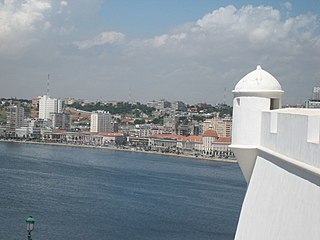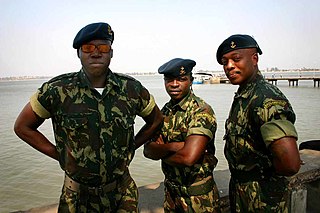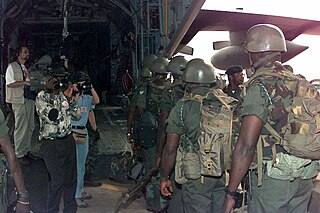
The Mozambique Defence Armed Forces or FADM are the national armed forces of Mozambique. They include the General Staff of the Armed Forces and three branches of service: Army, Air Force and Navy.

The United Nations Operations in Mozambique was a UN peace mission to Mozambique established in December 1992 under Security Council Resolution 797 with the assignment to monitor the implementation of the Rome General Peace Accords agreed upon by the Mozambican president Joaquim Chissano of FRELIMO, the Front for Liberation of Mozambique, and Afonso Dhlakama of RENAMO, the Mozambican National Resistance. The operation was one of the most significant and extensive UN operations and it sought to demobilize and disarm troops, provide humanitarian aid, and oversee the elections. The operation ended in December 1994.

The Mozambican Civil War was a civil war fought in Mozambique from 1977 to 1992. Like many regional African conflicts during the late twentieth century, the impetus for the Mozambican Civil War included local dynamics exacerbated greatly by the polarizing effects of Cold War politics. The war was fought between Mozambique's ruling Marxist Mozambique Liberation Front (FRELIMO), the anti-communist insurgent forces of the Mozambican National Resistance (RENAMO), and a number of smaller factions such as the PRM, UNAMO, COREMO, UNIPOMO, and FUMO.

United Nations Security Council resolution 782, adopted unanimously on 13 October 1992, after welcoming the Rome General Peace Accords signed on 4 October 1992, in Rome between the FRELIMO (government) and RENAMO (rebel) parties in the Mozambican Civil War, the council approved the appointment of an interim Special Representative and the deployment of up to 25 military observers to Mozambique. The Special Representative was an Italian, Aldo Ajello.

United Nations Security Council resolution 783, adopted unanimously on 13 October 1992, after recalling resolutions 668 (1990), 717 (1991), 718 (1991), 728 (1992), 745 (1992) and 766 (1992) and noting a report by the Secretary-General Boutros Boutros-Ghali, the council welcomed the progress the United Nations Transitional Authority in Cambodia (UNTAC) had made in Cambodia in accordance with the Paris Agreements, however it recognised various security and economic concerns facing UNTAC.

United Nations Security Council resolution 793, adopted unanimously on 30 November 1992, after recalling resolutions 696 (1991), 747 (1992) and 785 (1992), and expressing its concern at the deteriorating political situation and the resumption of hostilities in Angola, the Council approved a recommendation by the Secretary-General Boutros Boutros-Ghali to extend the mandate of the United Nations Angola Verification Mission II for a further two months until 31 January 1993.

United Nations Security Council resolution 797, adopted unanimously on 16 December 1992, after reaffirming Resolution 782 (1992), the Council decided to establish the United Nations Operation in Mozambique (ONUMOZ) as proposed by the Secretary-General Boutros Boutros-Ghali in line with the peace agreement for Mozambique.

United Nations Security Council resolution 804, adopted unanimously on 29 January 1993, after reaffirming resolutions 696 (1991), 747 (1992), 785 (1992) and 793 (1992), and expressing its concern at lack of implementation of the "Acordos de Paz para Angola" in Angola, the council approved a recommendation by the Secretary-General Boutros Boutros-Ghali to extend the mandate of the United Nations Angola Verification Mission II for a further three months until 30 April 1993.

United Nations Security Council resolution 818, adopted unanimously on 14 April 1993, after reaffirming resolutions 782 (1992) and 797 (1992) on the situation in Mozambique, the Council stressed its concern regarding the delays and difficulties affecting the implementation of the peace process envisaged in the Rome General Peace Accords during the Mozambican Civil War.

United Nations Security Council resolution 863, adopted unanimously on 13 September 1993, after reaffirming resolutions 782 (1992), 797 (1992), 818 (1993) and 850 (1993) on the situation in Mozambique, the council discussed the implementation of the Rome General Peace Accords.

United Nations Security Council resolution 866, adopted unanimously on 22 September 1993, after reaffirming resolutions 813 (1993) and 856 (1993), the council noted that United Nations involvement would contribute significantly to the effective implementation of the peace agreement in Liberia and went on to establish the United Nations Observer Mission in Liberia (UNOMIL).

United Nations Security Council resolution 882, adopted unanimously on 5 November 1993, after reaffirming resolutions 782 (1992) and subsequent resolutions on Mozambique, the council noted, in addition to positive developments in the country, that some aspects of the Rome General Peace Accords had not been implemented.

United Nations Security Council resolution 898, adopted unanimously on 23 February 1994, after reaffirming Resolution 782 (1992) and all subsequent resolutions on Mozambique, the Council discussed the implementation of the Rome General Peace Accords and established a 1,144 strong police component of the United Nations Operation in Mozambique (ONUMOZ).
United Nations Security Council resolution 916, adopted unanimously on 5 May 1994, after reaffirming Resolution 782 (1992) and all subsequent resolutions on Mozambique, the council decided to renew the mandate of the United Nations Operation in Mozambique (ONUMOZ) for a final period ending 15 November 1994, and discussed the implementation of the Rome General Peace Accords.
United Nations Security Council resolution 920, adopted unanimously on 26 May 1994, after recalling resolutions 637 (1989), 693 (1991), 714 (1991), 729 (1992), 784 (1992), 791 (1992), 832 (1993), 888 (1993), the council discussed the implementation of peace agreements in El Salvador and extended the mandate of the United Nations Observer Mission in El Salvador (ONUSAL) until 30 November 1994.

United Nations Security Council resolution 957, adopted unanimously on 15 November 1994, after reaffirming Resolution 782 (1992) and all subsequent resolutions on Mozambique, the Council welcomed the recent elections on 27–29 October 1994 in accordance with the Rome General Peace Accords and extended the mandate of the United Nations Operation in Mozambique (ONUMOZ) until a new government took office, but no later than 15 December 1994, with a full withdrawal by 31 January 1995.

United Nations Security Council resolution 1014, adopted unanimously on 15 September 1995, after recalling all resolutions on the situation in Liberia, particularly 1001 (1995), the council discussed various aspects of the civil war and extended the mandate of the United Nations Observer Mission in Liberia (UNOMIL) until 31 January 1996.

United Nations Security Council resolution 1020, adopted unanimously on 10 November 1995, after recalling all resolutions on the situation in Liberia, particularly 1001 (1995), the Council discussed the implementation of the peace process during the First Liberian Civil War and adjusted the mandate of the United Nations Observer Mission in Liberia (UNOMIL) to include other functions.

United Nations Security Council resolution 1045, adopted unanimously on 8 February 1996, after reaffirming Resolution 696 (1991) and all subsequent resolutions on Angola, the Council discussed the implementation of the Lusaka Protocol, and extended the mandate of the United Nations Angola Verification Mission III until 8 May 1996.
The Maputo Accord, officially the Maputo Accord for Peace and National Reconciliation, is a peace agreement between the Government of Mozambique and Renamo, signed on 6 August 2019, with the aim of bringing definitive peace to Mozambique. The agreement was signed by the President of the Republic of Mozambique, Filipe Nyusi, and the leader of Renamo, Ossufo Momade, in Maputo, and was the result of years of negotiations. It was preceded by the signing of the Agreement on the Definitive Cessation of Military Hostilities, on 1 August 2019, in Gorongosa.

















